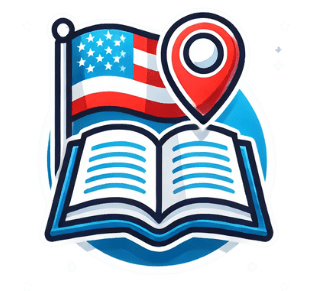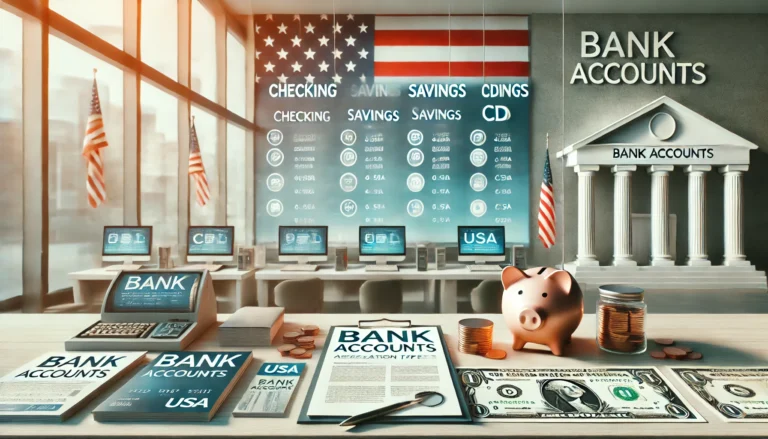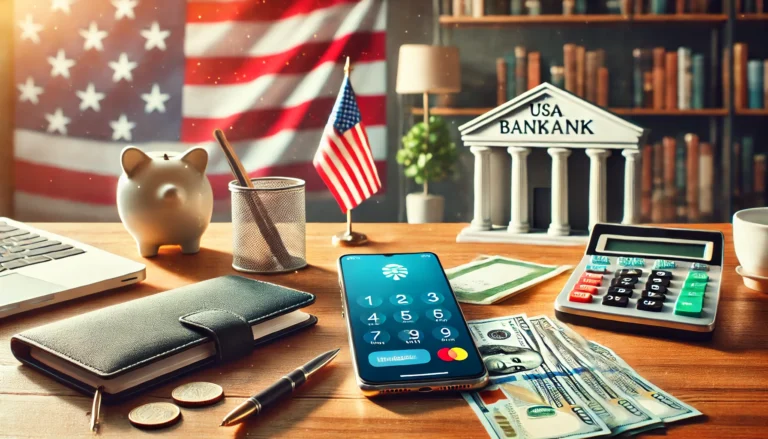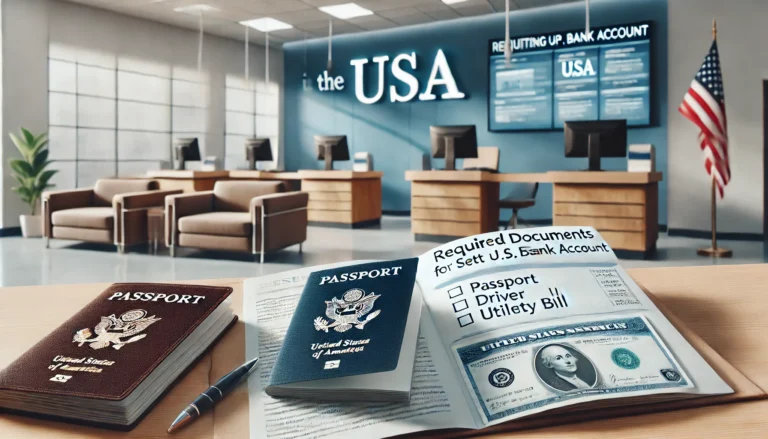Top U.S. Banks for Newcomers and Expats
Finding the right bank can be a daunting task, especially if you’re new to the United States. With a wide array of choices and a banking system that may differ from what you’re used to, it’s important to choose a bank that caters specifically to the needs of newcomers and expats. This guide will help you understand which U.S. banks are best suited for international clients and provide tips on how to make banking in the U.S. a seamless experience.
Table of Contents
- Why Newcomers and Expats Need a U.S. Bank Account
- Key Features to Look for in a U.S. Bank for Newcomers
- Bank of America: Comprehensive Services and Global Reach
- Benefits for Expats
- Account Options for Newcomers
- Chase Bank: Technology-Driven Banking for Modern Users
- Mobile and Online Banking
- Popular Account Choices
- Wells Fargo: Personalized Banking with a Nationwide Network
- Customer Service for International Clients
- Low-Fee Banking Options
- Citibank: Global Network and Flexible Account Solutions
- International Services
- Account Packages for Newcomers
- HSBC: Expat-Focused Banking with Global Advantages
- Multi-Currency Accounts
- International Advantage Program
- Capital One: Affordable Banking with No-Fee Accounts
- Online-First Approach
- 360 Checking and Savings Accounts
- TD Bank: Extended Hours and Cross-Border Banking
- Services for Canadian Newcomers
- Flexible Banking Solutions
- PNC Bank: Virtual Wallet and Digital Tools
- Integrated Banking Features
- Budgeting Assistance for Expats
- Tips for Opening a Bank Account in the USA as a Newcomer
- Preparing Documents
- Understanding Account Requirements
- Additional Considerations for Newcomers
- Credit-Building Tips
- Avoiding Common Banking Mistakes
- Frequently Asked Questions (FAQs)
- Conclusion: Choosing the Right U.S. Bank for Your Needs
1. Why Newcomers and Expats Need a U.S. Bank Account
When you arrive in the U.S., one of the first things you’ll want to do is open a local bank account. It’s more than just a convenience—it’s practically a necessity. With a U.S. bank account, you can easily receive your salary, pay bills, and manage your everyday expenses without the hassle of international transfer fees or currency exchange. For many expats, having a local bank account also means easier access to credit-building tools like credit cards, which can be difficult to obtain without a U.S. banking history.
Overcoming Initial Challenges
However, newcomers may face some challenges, such as figuring out which documents are required, understanding the different types of bank accounts available, and finding a bank that offers services tailored to their specific needs. For instance, not all banks accept international IDs or offer multilingual customer support, making it crucial to choose wisely.
2. Key Features to Look for in a U.S. Bank for Newcomers
Not all banks are created equal, especially when it comes to accommodating international clients. Here are some key features you should look for when choosing a bank as a newcomer or expat:
- Easy Account Setup: The best banks for newcomers allow for a smooth account-opening process with minimal requirements. Some banks may accept a foreign passport and proof of address, while others might need additional documentation, such as an Individual Taxpayer Identification Number (ITIN).
- Low or No Fees: Avoid banks that charge high monthly maintenance fees, ATM fees, or international transaction fees. Look for accounts that offer no-fee banking, low minimum balances, or options to waive fees under certain conditions.
- International Services: If you plan on sending or receiving money internationally, choose a bank that offers favorable rates on international wire transfers, currency exchange services, or multi-currency accounts.
- Branch and ATM Accessibility: Consider banks that have a large network of ATMs and branches, especially if you’re living in a big city or traveling frequently within the U.S. The convenience of having a branch nearby can save you time and money.
3. Bank of America: Comprehensive Services and Global Reach
Bank of America is one of the largest and most recognized banks in the U.S., offering a broad range of services that cater to international clients. Its extensive branch and ATM network, combined with comprehensive online banking features, makes it a convenient choice for newcomers.
Benefits for Expats
Bank of America has a variety of services that make it easier for expats to manage their finances:
- Multilingual Online Banking: The bank’s online banking platform supports multiple languages, which is helpful if English isn’t your first language.
- International Wire Transfers: The bank provides straightforward processes for sending money overseas, with reasonable fees and competitive exchange rates.
- Special Services for Non-Residents: For expats who don’t have a Social Security Number (SSN), Bank of America may accept alternative documentation, such as an ITIN, making it easier to open an account.
Account Options for Newcomers
Bank of America offers several account types suitable for newcomers, including:
- Advantage SafeBalance Banking: A checking account with no overdraft fees, which is perfect for those who want to avoid accidental overdraft charges.
- Advantage Plus Banking: This account offers more flexibility, including the ability to write checks and access to more banking features.
- Preferred Rewards Program: Once you establish your banking history, you can qualify for the Preferred Rewards program, which offers benefits such as reduced banking fees and better rates on savings.
4. Chase Bank: Technology-Driven Banking for Modern Users
Chase Bank is known for its advanced technology and excellent mobile banking features, making it ideal for tech-savvy newcomers who prefer to manage their finances on the go. With a large network of branches and ATMs nationwide, it’s also a practical choice for those who need in-person banking options.
Mobile and Online Banking
Chase’s mobile app is user-friendly and packed with features that make managing your money simple:
- Instant Transfers with Zelle: Send and receive money quickly through Zelle, which is integrated into the Chase app.
- Budgeting and Spending Tools: The app offers budgeting features that help you track expenses and manage your finances more effectively.
- Access to Customer Support: The Chase app provides easy access to customer service, including chat support for quick questions.
Popular Account Choices
Chase offers a variety of accounts suitable for newcomers:
- Chase Total Checking: This is one of Chase’s most popular accounts, with features that allow newcomers to waive monthly fees through direct deposits or maintaining a minimum balance.
- Chase Secure Banking: Designed for those who want simple, no-overdraft banking, this account has a low monthly fee and no hidden charges.
5. Wells Fargo: Personalized Banking with a Nationwide Network
Wells Fargo is another well-known bank in the U.S. that provides personalized services and a strong branch network. For newcomers who prefer a more traditional banking experience, Wells Fargo offers face-to-face support at numerous locations across the country.
Customer Service for International Clients
Wells Fargo is known for its customer-focused approach, which can be particularly beneficial for expats who need extra assistance understanding the U.S. banking system. Their staff are trained to help newcomers navigate the complexities of opening an account, transferring funds, and managing financial matters.
- Bilingual Support: Many Wells Fargo branches offer bilingual services to assist non-English speaking clients.
- Guidance for Newcomers: They provide resources and advice tailored to international clients, including financial education programs that help new arrivals understand how U.S. banking works.
Low-Fee Banking Options
Wells Fargo offers a variety of accounts that are affordable and flexible for newcomers:
- Everyday Checking: With low monthly fees that can be waived with a qualifying balance or direct deposits, this account is accessible to most newcomers.
- Clear Access Banking: A no-overdraft account with straightforward fees, ideal for those who want to avoid the risk of overdrafts.
6. Citibank: Global Network and Flexible Account Solutions
Citibank’s extensive international presence and wide range of account options make it a popular choice for expats who need access to global banking services. If you frequently travel or need to manage finances in multiple countries, Citibank can be a convenient choice.
International Services
Citibank is well-suited for those who have financial ties in different countries. They offer:
- Global Transfers: With Citibank’s network, you can easily transfer money between international Citibank accounts, often at favorable exchange rates.
- Multi-Currency Accounts: Citibank allows you to hold and manage funds in various currencies, which can be useful for those who deal with multiple currencies regularly.
- Priority Banking for Expats: Their global client services cater specifically to the needs of international clients, providing dedicated relationship managers to assist with banking needs.
Account Packages for Newcomers
Citibank offers account packages that include various benefits tailored for different financial needs:
- Citi Basic Banking Package: This package is great for everyday banking, with no minimum balance requirements if you make a qualifying deposit or have a monthly direct debit.
- Citi Priority Package: Offers higher-tier services with access to wealth management advice, preferred rates, and more personalized banking services.
7. HSBC: Expat-Focused Banking with Global Advantages
HSBC is an international banking giant with a long history of serving expatriates and international clients. Their experience in dealing with global customers means that they understand the unique needs of expats, making them an ideal choice if you require a bank that can handle international finances with ease.
Multi-Currency Accounts
For those who frequently deal with different currencies, HSBC offers multi-currency accounts that allow you to hold funds in various currencies without needing to convert every time you make a transaction. This is especially useful for people who travel often or have investments in other countries.
International Advantage Program
HSBC’s International Advantage Program is tailored specifically for expats and international clients:
- Free International Transfers: Enjoy fee-free transfers between HSBC accounts globally.
- Seamless Account Opening Across Borders: If you are relocating, HSBC allows you to open accounts in multiple countries simultaneously.
- Dedicated Expat Banking Support: Access to relationship managers who specialize in assisting international customers with their banking needs.
8. Capital One: Affordable Banking with No-Fee Accounts
Capital One is a great choice for newcomers looking for straightforward banking without complicated fee structures. With its emphasis on digital banking, Capital One makes it easy for newcomers to open and manage accounts online.
Online-First Approach
Capital One focuses on providing a seamless digital banking experience:
- User-Friendly Mobile App: Manage your finances through the Capital One mobile app, which offers features such as mobile check deposits, bill pay, and budgeting tools.
- Virtual Banking Assistance: Chat with customer service agents directly from the app for any banking-related questions.
360 Checking and Savings Accounts
Capital One’s popular 360 accounts are designed to make banking easy and affordable:
- 360 Checking: A no-fee account with no minimum balance requirements, making it ideal for newcomers who want a low-maintenance banking option.
- 360 Savings: Offers competitive interest rates with no fees or minimums, helping you grow your savings without the extra cost.
9. TD Bank: Extended Hours and Cross-Border Banking
TD Bank is known for its convenient services, including extended hours and weekend availability. With a strong presence along the East Coast, TD Bank is a practical choice for newcomers who need flexible banking hours.
Services for Canadian Newcomers
For Canadians moving to the U.S., TD Bank’s cross-border banking services make it easy to manage finances on both sides of the border:
- Cross-Border Banking Solutions: If you have accounts with TD Canada Trust, you can easily transfer funds between your U.S. and Canadian accounts.
- Canadian-Friendly Banking: Enjoy familiar banking services and features designed specifically for Canadians living in the U.S.
Flexible Banking Solutions
TD Bank offers a variety of accounts that cater to different needs:
- TD Convenience Checking: With low fees that can be waived by maintaining a minimum balance, this account is accessible for most newcomers.
- TD Beyond Checking: Provides more benefits, such as no ATM fees and higher withdrawal limits.
10. PNC Bank: Virtual Wallet and Digital Tools
PNC Bank’s Virtual Wallet is a unique offering that combines checking, savings, and money management tools into one comprehensive package. This integrated approach makes it easier for newcomers to manage their finances in one place.
Integrated Banking Features
PNC’s Virtual Wallet includes:
- Spend, Reserve, and Growth Accounts: The three-part account system helps you manage your money for spending, short-term savings, and long-term growth.
- Financial Planning Tools: Set goals, track your progress, and manage your budget with PNC’s built-in tools.
Budgeting Assistance for Expats
PNC Bank’s digital tools are especially helpful for newcomers who need guidance on managing their finances in a new country. The Virtual Wallet system encourages good financial habits and simplifies budgeting.
11. Tips for Opening a Bank Account in the USA as a Newcomer
Opening a bank account in the U.S. for the first time can be a bit overwhelming, especially if you’re not familiar with the local banking system. Here are some practical tips to help you get started:
Preparing Documents
Make sure you have the necessary documents before you go to the bank:
- Identification: A valid passport is usually required. If you have a U.S. visa or an Individual Taxpayer Identification Number (ITIN), bring those too.
- Proof of Address: Banks often ask for proof of a U.S. address, which could be a utility bill, lease agreement, or a letter from your employer.
- Additional Documentation for Non-Residents: If you don’t have a Social Security Number (SSN), some banks might accept an ITIN instead. It’s always a good idea to call the bank ahead of time to confirm what documents are acceptable.
Start with Basic Accounts
If you’re not sure which account to choose, consider starting with a basic checking account. This will allow you to get familiar with the bank’s services, and you can always open additional accounts later, such as savings or credit-building accounts.
Use International Services Wisely
If you plan on transferring money abroad or dealing with multiple currencies, make sure to choose a bank that offers favorable rates for international transfers. Some banks may offer fee-free transfers between their international branches, which can help you save on costs.
12. Additional Considerations for Newcomers
Navigating the U.S. banking system as a newcomer involves more than just choosing a bank. Here are some extra tips to help you get settled:
Credit-Building Tips
Building credit is crucial in the U.S. for things like renting an apartment, buying a car, or even getting a job. Here’s how you can start:
- Apply for a Secured Credit Card: A secured credit card requires a cash deposit that acts as your credit limit. By using it responsibly, you can build a positive credit history.
- Make Payments on Time: Always pay at least the minimum amount due on your credit card or loans to avoid late fees and build good credit.
Avoiding Common Banking Mistakes
To ensure a smooth banking experience, be aware of common pitfalls:
- Watch Out for Overdraft Fees: If your account balance goes below zero, many banks charge overdraft fees. Consider choosing a no-overdraft-fee account to avoid this.
- Understand the Terms and Conditions: Be sure to read the fine print when opening an account. Some banks have fees that can be avoided if you meet certain requirements, like maintaining a minimum balance.
13. Frequently Asked Questions (FAQs)
- Can I open a U.S. bank account without a Social Security Number?
Yes, many banks allow you to open an account with a passport and an ITIN. Some banks may have additional requirements, so it’s best to check ahead. - Which bank is best for international transfers?
Banks like HSBC and Citibank are popular choices due to their global presence and expat-friendly services that often include multi-currency accounts and fee-free international transfers between branches. - What documents do I need to open a U.S. bank account?
Typically, you’ll need a valid passport, proof of address, and either a Social Security Number (SSN) or an ITIN. Some banks might also ask for a visa or work permit. - Is it hard for newcomers to get a credit card in the U.S.?
It can be challenging, but many banks offer secured credit cards or student credit cards for those who are just starting to build their credit history. - Can I use my U.S. bank account internationally?
Yes, most U.S. banks allow you to use your debit card for international purchases and ATM withdrawals, but it’s important to check the fees for international transactions.
14. Conclusion: Choosing the Right U.S. Bank for Your Needs
Choosing a bank as a newcomer or expat in the U.S. is an important decision that can impact your daily life, financial health, and ability to build credit. Whether you’re looking for a bank with no fees, international services, or a strong branch network, the options listed in this guide cater to a variety of needs. Assess your financial goals, consider the features that matter most to you, and choose a bank that aligns with your lifestyle.
By taking the time to understand what each bank offers, you can make a choice that will help you settle in comfortably and manage your finances with ease. Remember to start with the basics, keep your documents in order, and take advantage of the resources offered by your bank to build a strong financial foundation in the United States.





